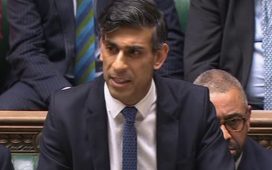Boris Johnson appeared to suggest the government would have to take extra measures to help the lowest-paid weather the financial impact of coronavirus, as Labour pressed for urgent action.
The prime minister was asked about the impact on poorer households after he announced that any family in which someone has a persistent cough or a fever should all stay at home for a fortnight.
“We certainly will bringing forward all measures that we can,” he said. “You’re totally right, we’re going to have to look after people, and help them for a considerable period. The principle guiding us is that nobody should be penalised for doing the right thing.
“We hope very much that people listening to this will feel that they can take the measures that have been outlined, in the knowledge that they will be effective,” he added.
Labour is urging the government to take a series of measures to protect the incomes of the poorest, including introducing a ban on evictions for tenants whose income is hit by the coronavirus.
The government will publish a bill on Thursday, giving it sweeping powers to tackle the pandemic.
These are expected to include the ability to detain and quarantine sufferers; to halt mass gatherings; and to expand class sizes and keep schools open if necessary.
Labour is not expected to oppose the thrust of the legislation – potentially allowing it to pass through the House of Commons without pressing it to a vote. But it is urging the government to focus more on the plight of the poorest.
The shadow housing secretary, John Healey, said measures should include a ban on evictions, where a tenant’s income has been affected by the virus.
“Our current threadbare legal safety net means renters are vulnerable to eviction if they get ill and fall behind on their rent. The fear of being evicted may also mean workers are reluctant to stay off work and self-isolate.
“Our emergency legislation would protect renters from eviction and we urge the government to work with us to adopt it and implement it at the earliest opportunity,” he said.
Jeremy Corbyn wrote to the prime minister on Saturday, urging him to take more action to help the most financially vulnerable.
Other measures Labour is demanding include a significant increase in statutory sick pay, and an expansion of the categories of workers entitled to it – a change that would also require legislation.
In his letter to Boris Johnson, Corbyn said: “There must be full sick pay and lost earnings protection from day one for all workers including insecure workers, low paid workers, and the self-employed, during self-isolation and illness.”
Senior Labour figures including the shadow health secretary, Jon Ashworth, are being briefed on the contents of the government’s legislation. The powers are due to lapse when the outbreak diminishes.
Asked earlier on Monday whether the government might need to do more to help the lowest paid, the prime minister’s official spokesman said: “I would point you back to the measures in the budget.”
These included waiving the usual seven-day wait for employment support allowance (ESA), and making statutory sick pay available immediately, instead of after four days. Firms will also be able to claim taxpayer support where they pay out sick pay.
But Labour has pointed out that SSP amounts to just £18 a day – and that many people, including the low-paid and the self-employed, are not covered.
Torsten Bell, the director of the thinktank the Resolution Foundation, has called for entitlement to be extended; and for ESA, which is worth £73 a week, to be increased.
The real value of many benefits has been eroded over the past decade, as Conservative governments have sought to slash the welfare bill.
“Sick pay for a typical worker entitled to it only covers 30% of their wages. We can increase that now,” Bell said. “Out of work benefits are worth even less than sick pay. The state exists to bear risk in times like these – but we’ve been pushing risk on to people.”
The government is increasingly focused on the economic, as well as the health impacts of the virus. Johnson hosted a briefing with the new Bank of England governor, Andrew Bailey, and the chancellor, Rishi Sunak, on Monday.
Sunak is also chairing a new economic and business response committee, involving other key ministers including the transport secretary, Grant Shapps, to coordinate the government’s response to growing demands for financial support to ailing firms and organisations.
Johnson will participate in a video conference with his fellow G7 leaders later on Monday, in which they will discuss coordinating both the health response to the crisis, including work on a vaccine, and the economic response. However, the US has as yet displayed little enthusiasm for international cooperation.
Johnson will set out the government’s next steps in tackling the virus at the first of his daily press conferences on Monday afternoon – and is expected to give more details about how the over-70s will be asked to shield themselves from the virus.













